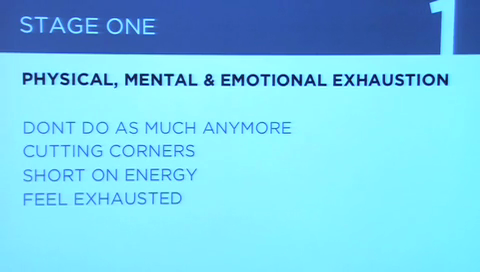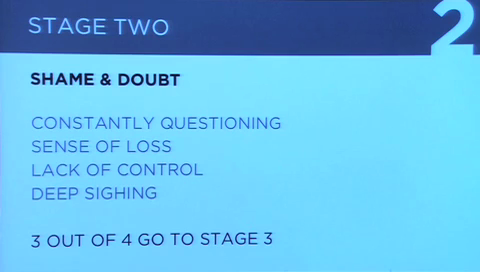Session at Broad.Cat 2009 conference
November 27, 2009
The transcript of Mark's session from https://vimeo.com/9548998
Who am I? What do I actually do? What I've found is there seems to be a real disconnect between who I think I am and what I do, and what other people think about me. How do you explain what you do to your mother? I can't. It's really, really tough. And the problem is everybody adds their own idea of who you are and what you do and everybody seems to have a different thing. What am I? A screen designer or a motion graphics artist or a visual effects artist or a 3D artist or all of those things. Who am I?
We define ourselves by our titles. We imagine that says something about us, and in some ways it's good because it gives us a sense of easy identity. I'm a creative type or I do this and that and so I say, I'm a visual designer. It's kind of creative. So it does tell people I work in the creative arts in some way, but it doesn't really tell them what I do. But it does give us some sense of identity.
The real problem creeps in when your title has nothing to do with what you actually do. You know you are much more, you could be much more than that title describes, and unfortunately the way the title holds you in place, it makes it very, very difficult.
Now the second aspect which builds on this is what do you actually do for your job? This can actually be very different from what your job title is. You may think you're doing one thing. I'm a graphic designer, I design graphics, and then you find yourself doing something rather different. It's something I've noticed a hell of a lot over the years. Perhaps you're expected to be designing beautiful things day in, day out, creating stunning graphics and incredible animations and well crafted stories. But the reality is slightly different.
You find yourself dealing with colleagues and customers, they're tricky at the best of times and can be constant challenge to maintain any kind of creativity. And the expectations of people and the way you have to deliver in a work environment that consists of many and sometimes very counterproductive voices. You find yourself having to become a politician, a psychologist, a manager. You have to do all of these different roles.
And the last part of this is your creative identity. Who are you? How does this fit in between job title and what you do? It is down to something really simple. What do you love to do? What is it? Why did you do this job? Why did you start doing it? What is your passion about this thing? It's probably the most important area that you can consider.
There's a difference between what you want to do on those other two things. I can't make any lists here. I can't really talk about this very much because it's so individual and every single person is different. Every single person has something they think drives them, interests them. It's a really tough one to go into. But if you are not doing something that you like, that you love, that you are passionate about, you are just doing a job. You are a trade person, a plumber, you are a postman, you are a butcher. You are doing just a process job. You are doing this, you are doing that.
If you are doing the job that you love, if you are doing something that you are passionate about, then you are actually changed from that. You are no longer a trades person. You are a crafts person. You are practicing something and creating something. You are not just going through the motions. A creative is a core part of actually our being. It is a lifestyle. It is not a job. This is who we are. This is what we do.
So when something is not right in our professional lives, it affects our entire life. We don't have these barriers in place like a lot of people have. We don't go home and do something completely different a lot of the time. When that disconnect grows to a certain point between what we think we do and what we end up doing, the dissatisfaction can lead us into some rather interesting places. That is burnout.
Burnout's recognized as generally coming in stages. These are stages of the condition and how it expresses itself. This is how people behave when they are going through it. See if you recognize anything here. If anybody is brave enough, stick your hand up when you recognize something.

You have stage one. It is encompassed as physical, mental and emotional exhaustion. We don't do as much anymore as we used to. We used to be doing everything we could. We start cutting corners, short on energy. Generally we feel exhausted. We are tired all the time.

Stage two is what you call shame and doubt. They are very real things. This is actually a clinically approved diagnostic. You are constantly questioning yourself. You have a feeling of insecurity. You are questioning your past accomplishments. You are losing confidence in the future.

Get a three or all of them. Go to stage three, cynicism and callousness. This is hard to describe except in one word which is attitude. There is only one thing to this. You know who I am talking about. You have met them. They are busy. They are hassled. They are generally full of shit. These people won't give you the time of day as far as creative goes.

If you have that, you go straight to stage four. There is no waiting here. This is what you call failure, helplessness and crisis. That is it. You don't. You have no idea what you are doing anymore. You hate what you are doing. You hate where you are. You hate everything. Oddly enough, the clinical manual ends here.

I have actually added my own. I call it stage five. There is no stage five. I added something in here myself.

It is jump. What does that mean? For some people it literally means they jump. They jump off something. They can't take it anymore. For most people it is this deep down feeling that you are in serious, serious trouble and you have to jump. Generally it can evolve jumping out of your job, jumping out of your trade, jumping out of and destroying personal relationships. You jump out of countries. You change locations. You change cities. You move countries. Sometimes you move to Canada in the middle of winter. Which was a very odd choice.
The fact is this is a defence mechanism that you have to get out of the situation around. It works for me in some respects. You need to change stuff and it wakes you up. So it is for me anyway.
What do I do? I call myself a visual designer. Of course it doesn't mean anything at all. But it can also mean anything you want it to. It means I am not constrained by that title. It means if someone actually cares to ask, they have the opportunity to discuss the things I love doing and enjoy and I am actually good at.
So what I am actually good at? What is it? What is my actual job? What I arrived at was that I tell stories. That is all I do. I tell stories using data. I do it in a very specialised way. Whether it is doing graphic design, motion graphics and now even in software - I tell stories using data. Because storytelling is at the heart of what I do, I feel free to do anything I want that encompasses that.
If I want to, I can write or I can film make or photograph or documentary or anything. Because what I am into is telling stories. I happen to tell it right now using this different way in a particular way. I can integrate into that core value thing I love doing using all those other little things I love.
The reason I do it this way now is because I am into UI and type and displaying data in interesting ways and doing things with it. I will admit I have not yet found the perfect job and the perfect place. It really, really is hard to do that. You have to keep trying. Sometimes it is easy to stay where you are rather than working out what your creative identity is. It is not easy work. And applying that knowledge and doing something with it is even harder.
I actually had to go to Helen back to find out some of this out. I hope a few of the things I discussed here, even though my little session is now a little choppy, will at least give you some little bit of an idea and a direction, and also some of the things to watch out for, so you yourself might not have to repeat some parts of that journey.
Knowing that there is a problem is half the solution to dealing with anything. I really do hope you manage to find out what your passion is and use it and live with it, whether it be filmmaking, motion graphics or animation. As creators, it is absolutely critical and important to love what you do. It is central to our being, and the only way to have an enjoyable and productive and, of course, creative career is to do that. Gracias. Thank you.